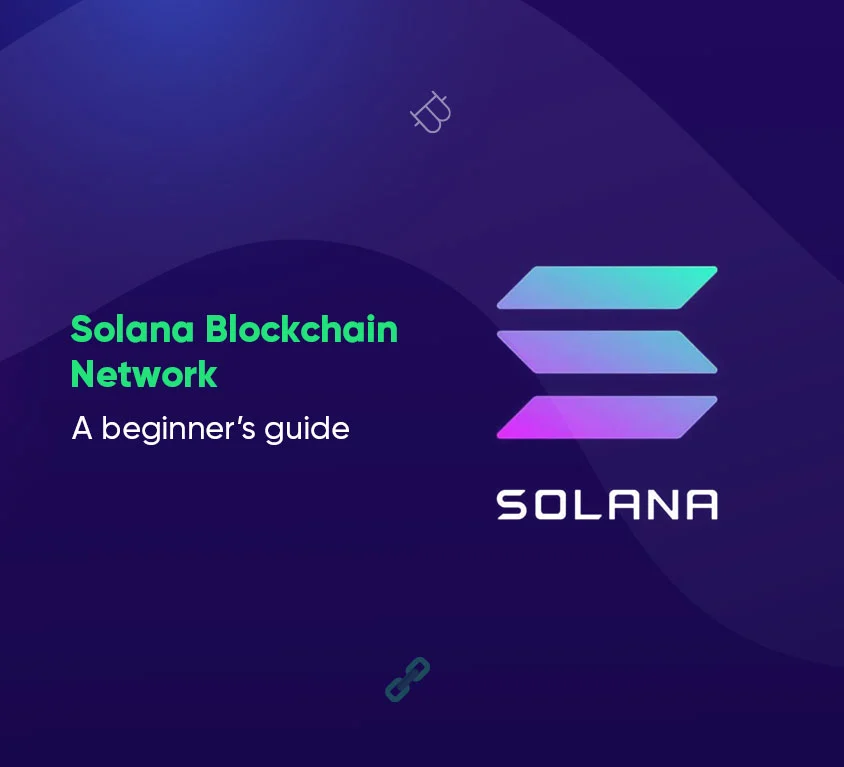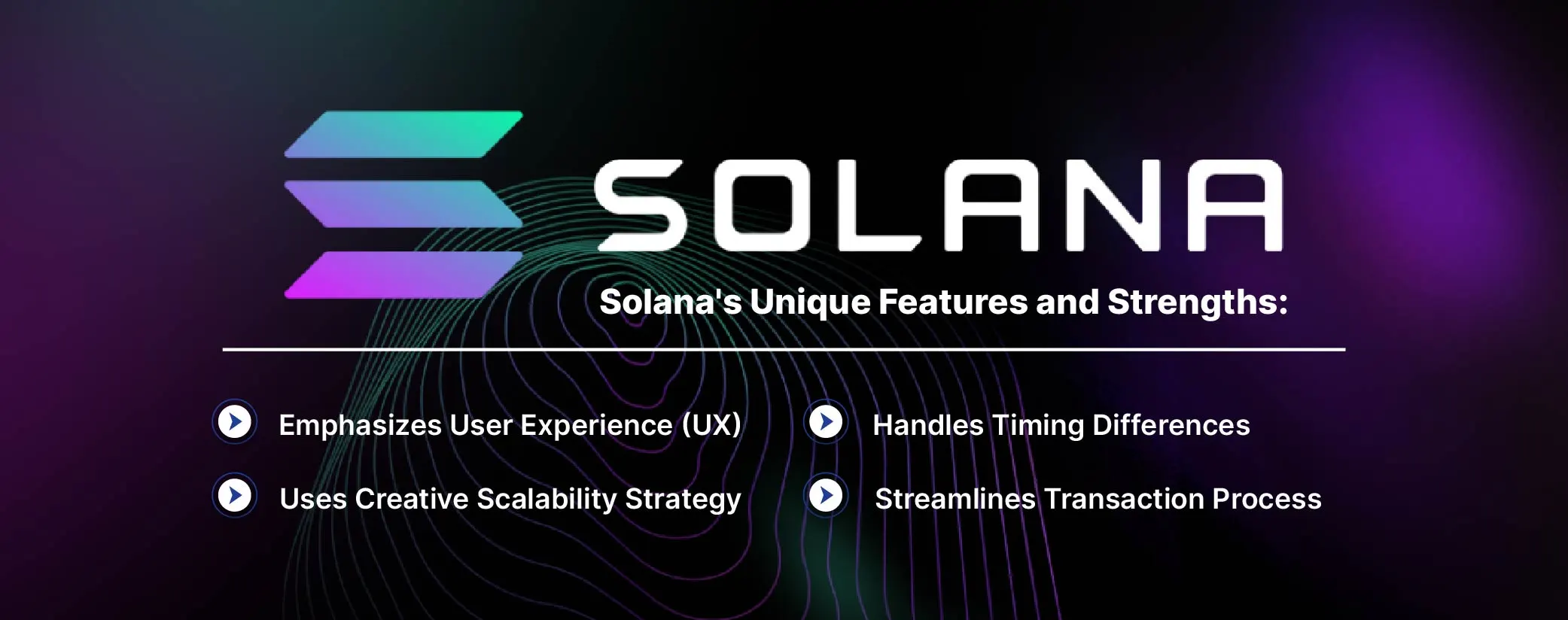
Introduction
Web3 & Blockchain Consultancy :
Solana Blockchain Network: A Beginners Guide
Blockchain technology is reshaping industries and revolutionizing how data is secured and transactions are conducted. As the demand for Blockchain developers continues to grow, it is important to understand that blockchain developers need to stay updated on trends and master the essential skills that are needed to excel in this dynamic field. Moreover, one should know which is the right blockchain solution for your business. Traditional systems struggle to handle transactions faster than centralized payment methods, causing bottlenecks in managing large volumes. Inefficiency in logging and synchronizing time between nodes exacerbates these issues. However, to solve these drawbacks Blockchain Network is working as a front run and addresses these challenges by handling transaction volumes once considered unattainable. In this blog, we will go through the definition of Solana Blockchain Network, how it works, and all you need to know as a beginner. Let’s start;What is Solana Blockchain Network?
Solana (SOL) is a blockchain platform that was founded in 2017. It was designed to fulfill the aim of providing a decentralized, scalable infrastructure for applications. It was developed by the Solana Foundation and Solana Labs. Moreover, It operates as an open-source project. Solana blockchain network distinguishes itself by its superior transaction processing speed and lower fees compared to rivals like Ethereum. It has a place in the blockchain space as a third-generation blockchain, Solana that is enhancing scalability while maintaining cost-effectiveness.Features of Solana Blockchain
- Utilizes a hybrid model for processing over 710,000 TPS.
- Supports smart contracts, decentralized applications, decentralized finance platforms, and NFT marketplaces.
- Opts for a single-layer blockchain design, reducing the need for additional scaling solutions.
- Native cryptocurrency, SOL, plays a crucial role in value transfer and blockchain security.
- Introduced in March 2020, SOL has quickly risen to the top 10 cryptocurrencies.
- Solana is a high-performance blockchain platform focusing on scalability, versatility, and efficient transaction processing.
How Does Solana Work?
The blockchain protocol known as Solana takes a novel approach to blockchain consensus algorithm methods by emphasizing proof of stake and proof of history. The protocol creates a digital log of all network events, which is represented as a cryptographic clock. This function with proof of stake guarantees the security, functionality, and transaction validation of the network. These cryptographic clocks are installed on every node in the Solana network, guaranteeing effective event tracking and removing the need for additional validators to confirm transactions. Solana technology is designed as a decentralized, scalable, and secure protocol because it employs algorithms to eliminate blockchain software’s performance bottlenecks.
Where can you buy Solana?
- Create an account on a cryptocurrency exchange to purchase the Solana token, SOL.
- Prominent exchanges that let customers purchase and sell SOL with US dollars (USD)
- Kraken’s Coinbase Exchange
- CoinDCX cryptocurrency investing app
- Gemini

What Makes Solana Unique From Other Blockchain Networks?
Solana is unique because of several distinctive features;- A plus is Solana’s emphasis on offering a smooth user experience. Cryptocurrency and blockchain adoption can be greatly aided by intuitive user interfaces and seamless interactions.
- Solana stands out due in part to its creative scalability strategy. In contrast to many decentralized blockchains, Solana achieves high throughput without the need for external Layer 2 solutions to handle increased transaction volumes.
- Solana’s PoS mechanism, which assigns a single “leader node” to manage transactions, effectively addresses timing differences in traditional decentralized networks.
- The use of a leader node streamlines the transaction process, enhancing transaction speed and user satisfaction, and ultimately improving network performance.

How to Invest in Solana?
-> To invest in Solana Tokens (SOL) through Crypto exchange:- Choose a Crypto Exchange
- Crypto exchanges facilitate cryptocurrency trades.
- Look for exchanges with low account minimums and trade fees.
- Buy SOL
- Fund your account with existing cryptocurrency holdings or a bank account or debit card.
- Consider using a credit card as it may be viewed as a cash advance and incur higher fees.
- Store Your SOL
- Use a crypto wallet to store your tokens.
- Options include hardware wallets (physical devices), paper wallets (secured keys on paper or QR codes), software wallets (connected to the internet), and crypto exchanges (stored on platforms like CoinBase).
- Relying on an exchange for storage can be risky and recommended for small amounts and short periods.
- Open a CoinDCX account by signing up
On the sign-up page, provide a working email address and your user name. To protect your account, create a strong password after the email address has been validated.
- Check the account:
To purchase a SOL token on the CoinDCX platform, you must finish your KYC. Your account will be set up in 15 minutes if you simply upload the necessary documents.
- Purchase SOL INR:
You can begin your cryptocurrency adventure by depositing any amount of fiat money you feel comfortable with once the account has been verified.
Solana vs Ethereum
Solana and Ethereum are two prominent players in the blockchain, as of their comparison, each boasts distinct features. For example; Solana and Ethereum both have smart contract capabilities, which is important for advanced applications like decentralized finance and NFTs. They use a proof-of-stake consensus mechanism, where validators stake their cryptocurrency as collateral for rewards. Solana enhances this model by introducing Proof-of-History (PoH), providing more dependability and efficiency. In 2021, Solana outperformed Ethereum in terms of transaction processing speed and costs, with an impressive throughput of over 2,700 transactions per second and an average transaction cost of just $0.00025. This makes Solana a more attractive choice for developers and users.
Solana |
Ethereum |
|
| Scalability | High throughput and fast transaction processing speed, use a unique Proof-of-History mechanism for scalability. | Historically faced challenges with scalability, but upgrades aim to address these issues. |
| Transaction Speed and Costs | Processes high transactions per second with low costs. | Historically faced issues with network congestion and high gas fees. |
| Ecosystem and Adoption | A popular choice for decentralized applications, especially DeFi and NFTs. | Well-established and widely adopted ecosystem. |
| Upgrades and Development Roadmap | Known for innovative features. | Aims to maintain or improve decentralization with Ethereum 2.0. |